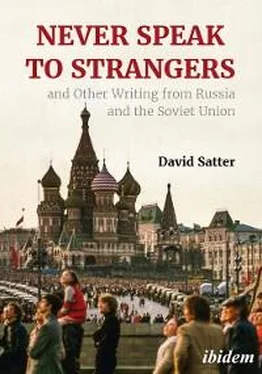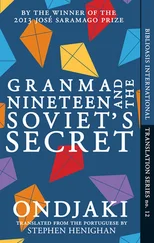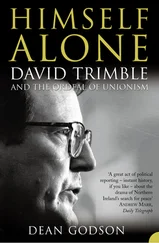The Soviet forces have secured major cities and the roads between them, but military observers believe they have not adjusted psychologically to the kind of war they are fighting. The vast amounts of ultra-modern equipment they have moved into Afghanistan, including the latest rifles, mortars, anti-aircraft missiles and long-range artillery, can be thoroughly tested in Afghanistan but the equipment is of little use in pursuing the guerrillas on their own terrain.
Soviet and Afghan units typically respond to calls for help from beleaguered local authorities only to arrive and find that the Afghan rebels have disappeared. They may search houses and make a few arrests, but they do not take drastic action to assert government authority. The rebels return as soon as the Soviet units withdraw.
When Soviet and Afghan units come into direct conflict with the Afghan rebels, the rebels are usually the initiator and the Soviet troops normally take up defensive positions behind their heavy equipment. This minimises casualties, but does little to suppress the insurgency. The Soviet troops apparently seldom pursue the rebels on foot into the mountains.
The deployment pattern suggests the Russians believe their own propaganda about defending the Afghans against “foreign aggression.” There have been punishing Soviet strikes against some rebel strongholds, including, most recently, a battle involving hundreds of Soviet tanks in the Ghazni area, south of Kabul. But the Soviet force, military specialists believe, would have to be increased to no less than a quarter of a million men if they were to subjugate the entire country.
The Soviet authorities appear hesitant to commit a much larger number of troops, and the reasons may be both military and political. Massive attacks and a huge Soviet presence could eliminate any possibility of President Babrak Karmal’s government broadening its base. If indigenous support for the Karmal’s Government cannot be created, a large Soviet occupation force will have to remain in the country for many years.
The Soviet authorities may, therefore, be very uneasy. The war is unpopular in the Soviet Union.
The Soviet newspapers say almost nothing about casualties or fighting—aware that they cannot count on broad public support. Reports from Afghanistan have concerned Mr Karmal’s Government, co-operation between Soviet and Afghan specialists, and the successes of the Afghan army against “gangsters” “criminals” "mercenaries” and “bandits,” with Soviet troops said to be playing only a support role.
The control over information affects the families of soldiers posted to Afghanistan. Throughout a Soviet soldier’s service, his relatives know only the number of his division but not where the soldier and division are posted. There have been cases of Soviet soldiers passing word to their families that they were not in Afghanistan. When a soldier is killed in battle, his family is told that he was “killed in the fulfilment of his duties”—the same formula used for accidental death—but not where he died or how.
This lack of information has softened the impact of Afghanistan. Many of the seriously wounded are treated in East Germany, and maimed or disfigured soldiers are reported to be resting in sanatoria on the Black Sea. They will probably not return to their home towns until after the Olympics at the earliest.
Sometimes, however, reality still manages to intrude on the all-but-pervasive impression in Moscow of a distant war against an ill-defined foe. Thirty officers were reported in mid-April to have been buried in the military cemetery in Kiev, a high toll for one locality. By the end of the month, there were 25 more fresh graves.
The Soviet takeover in Afghanistan was rapid and painless, but the Soviet authorities may be unable to consolidate their control so easily. The war has had little impact on Soviet society so far, but the choices which the Soviet armed forces must face suggest that, even with only the barest access to information in Moscow, the Afghan War may soon come to people’s attention of its own accord.
Financial Times, Wednesday, June 4, 1980
Afghanistan
Moscow Starts ‘Phoney War’ Over Peace
With Afghanistan far from pacified, but at least firmly under Soviet control, the conflict has entered a new stage which, adapting a phrase from forty years ago, might best be described as the “phoney war.”
A bewildering series of proposals, suggestions and “hints” have been put about by the Soviet and Afghan governments, to the effect that Soviet troops can be withdrawn when “outside interference” in Afghanistan’s affairs is brought to an end.
MValery Giscard d’Estaing, the French President, met Mr Leonid Brezhnev, the Soviet President, in Warsaw in an effort to “keep the lines of communication open”; and Herr Helmut Schmidt, the West German Chancellor, is due in Moscow later this month when a new West German-Soviet 25-year economic agreement will be on the agenda.
There is a lull in Soviet military activity in Afghanistan and the number of Soviet troops in that country has levelled off at 80,000, with another 25,000 stationed across the border on Soviet territory. One might almost assume that an agreement on Soviet troop withdrawals was imminent.
If precedent is any guide, however, it is far more likely that the West is witnessing a carefully orchestrated campaign whose purpose is not to prepare the way for Soviet troop withdrawals but to undermine support in Western Europe for economic sanctions against the Soviet Union, and prepare the groundwork for the eventual recognition, particularly in the Islamic world, of the Soviet-backed government of Mr Babrak Karmal.
Shortly after Soviet forces crossed the Afghan border in strength last December, Soviet official spokesmen said they had moved in at the request of the Afghan government in order to protect it against “outside interference.” There was no evidence of interference by anyone but the Soviet Union at the time, and none has materialised since. But Mr Brezhnev offered this explanation to U.S. President Jimmy Carter, and Mr Carter reacted by doubting the truth of what Mr Brezhnev said.
In the months since the invasion, the Soviet way of using language has become less confusing. By “outside interference,” the Soviet authorities mean the indigenous Afghan revolt against Soviet occupation; and when they speak of an end to “outside interference,” they are seeking an end to foreign backing for the rebels. This would—for the moment—leave the Karmal government in outright control, making the presence of Soviet forces unnecessary.
The Soviet peace offensive is now four months old but even M Giscard d’Estaing, whose meeting last month with Mr Brezhnev in Warsaw was hailed in the Soviet press as a “fruitful dialogue,” did not deflect Soviet determination to remain in Afghanistan until all resistance to the Karmal government has ceased.
The Soviets, on an official level, are still repeating what Mr Brezhnev said to Mr Carter about “outside interference,” but they have received free publicity for their peaceful intentions by continually reformulating their propaganda position to create the impression that they were offering something new.
Mr Brezhnev, for example, told Mr Armand Hammer, the President of Occidental Petroleum and a major supporter of U.S. Soviet trade that the Soviet Union would not insist on U.S. guarantees of an end to all “outside interference” (in effect, all Afghan resistance which the U.S. has no interest in ending) in return for troop withdrawals recognising that the U.S. might not be able to restrain all the elements at work in Afghanistan.
In April, the Karmal government offered to open negotiations aimed at normalising relations with Iran and Pakistan, based on an end to “outside interference” in Afghanistan’s internal affairs. The offer was doubly unrealistic because Iran and Pakistan not only have no interest in helping suppress the Afghan rebellion, but they also want no part of the Kamal government, which neither country recognizes.
Читать дальше












